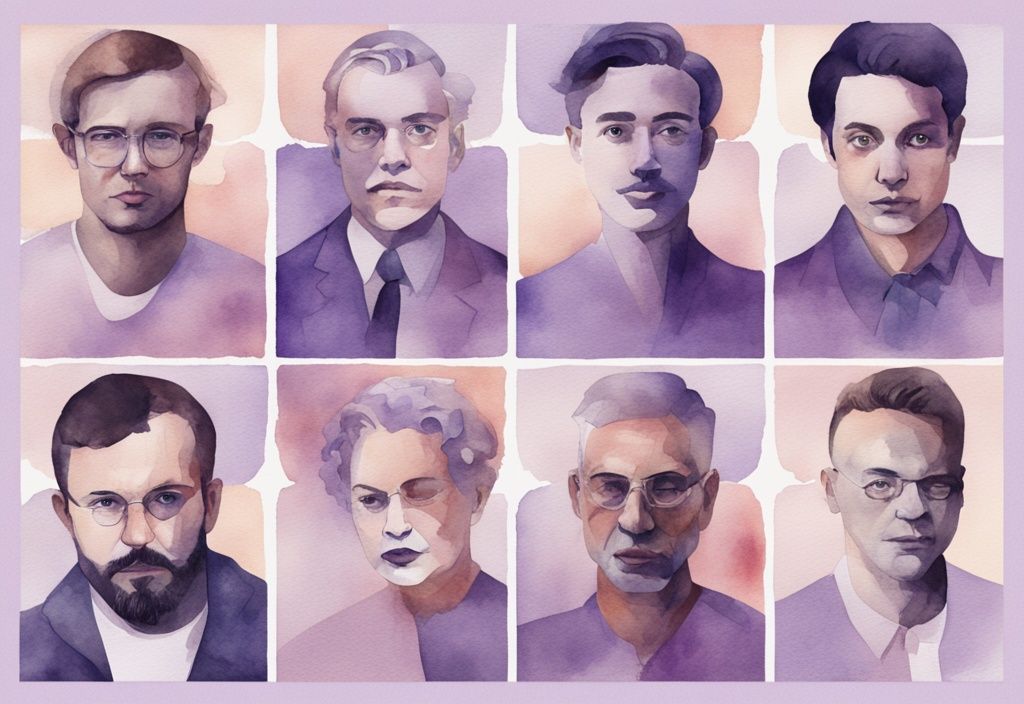Top Famous People with Narcissistic Personality Disorder Unveiled
Have you ever wondered what makes the famously exuberant stars tick? Famous personalities with Narcissistic Personality Disorder (NPD) often captivate us with their charisma and larger-than-life behavior. This article reveals some of the dark truth behind the glitz and glamour.
We’ll navigate through the enigmatic lives of renowned individuals who were either rumored or officially diagnosed with NPD. We’ll also see how their narcissistic traits not only impacted their lives but society’s perception of them as well.
Finally, let’s pull back the veil on NPD, digging deeper into understanding the complexities of narcissism, and how to cope with narcissistic behavior in our own lives. Are you intrigued? Let’s dive in!
What is Narcissistic Personality Disorder?
Narcissistic Personality Disorder (NPD) is a complex mental health condition characterized by a pervasive pattern of grandiosity, a constant need for admiration, and a distinct lack of empathy. Unlike everyday narcissistic traits, NPD profoundly impacts an individual’s behavior and relationships, often leading to significant challenges in personal and professional settings.
Distinguishing Narcissism from NPD
- Narcissism as a personality trait involves self-belief, high self-esteem, and confidence. It’s commonly seen in individuals who display strong leadership and assertiveness. However, it doesn’t necessarily result in the negative impacts often linked to NPD.
- Narcissistic Personality Disorder (NPD) is a more severe condition characterized by extreme self-absorption and a distorted, glorified sense of self. This condition significantly impacts behavior and relationships.
- Lack of empathy for others and manipulative behaviors are hallmarks of NPD. Individuals often struggle to understand or value the emotions and needs of others, leading to frequent interpersonal issues.
Common Traits and Characteristics of NPD
- Exaggerated sense of self-importance and a need for excessive admiration. Individuals with NPD often require constant praise to bolster their self-esteem.
- Oversized ego and sense of entitlement. People with NPD expect special treatment and often believe they deserve more than others.
- Manipulative behaviors and exploitative relationships. Individuals with NPD may use others to achieve their goals, showing little regard for the impact of their actions on others.
-
Lack of empathy and the inability to recognize or respect others’ needs. This often results in strained relationships and conflicts.
In this video, explore the key traits and behaviors associated with Narcissistic Personality Disorder (NPD) and learn how these characteristics often manifest in famous personalities, providing insight into their public personas and interpersonal dynamics.
Diagnosis and Professional Assessment
- Only a certified mental health professional can diagnose someone with NPD. It must be distinguished from general narcissistic traits that do not disrupt everyday functioning to the same extent.
- Diagnosis involves a comprehensive psychological evaluation and an assessment of symptom criteria. This process includes interviews, questionnaires, and sometimes behavioral observations to accurately identify NPD.
Examples of Famous People Rumored or Diagnosed with Narcissistic Personality Disorder
Delving into the realm of well-known personalities, we often find intriguing instances where individuals either rumored or diagnosed with Narcissistic Personality Disorder (NPD) come to the forefront. Their stories provide a lens to understand the complexities and profound impacts of this mental health condition.
Joan Crawford
Joan Crawford, an iconic figure in the Hollywood Golden Age, is often cited as an exemplar of extreme narcissism. Her alleged narcissistic behavior is highlighted by accusations of abuse towards her adopted daughter. This profound impact on family dynamics showcases her manipulative and controlling nature, creating a deeply toxic environment at home.
Kanye West
Kanye West, a prominent rapper and fashion designer, is frequently discussed in the context of NPD due to his grandiose self-perception and frequent public outbursts. His infamous interruption of Taylor Swift’s award speech exemplifies his need for self-admiration. Furthermore, Kanye’s ambitious pursuits, such as running for President, reflect his exaggerated sense of self-importance and relentless quest for the spotlight.
Kim Kardashian
Kim Kardashian, a media personality and businesswoman, is renowned for her intense focus on self-promotion and extensive use of social media. Her rise to fame, significantly bolstered by releasing a sex tape, is cited as an example of using notoriety to gain public attention. This behavior aligns with traits of narcissism, highlighting her willingness to exploit personal aspects of her life for fame.
Mariah Carey
Mariah Carey’s career is marked by her renowned diva antics and overbearing behavior. From her grandiose self-image to her dismissive attitude towards others’ time, Carey’s actions often reflect a superiority complex. Her tendency to demand special treatment and her lack of consideration for others further reinforce the narcissistic traits attributed to her.
Madonna
Madonna, a pop culture icon, continually reinvents her image to maintain her position in the limelight. Her pronounced sense of entitlement, evidenced by unreasonable demands on employees and collaborators, showcases traits of narcissism. Continuous self-promotion and attention-seeking are key elements of her public persona.

Donald Trump
Donald Trump’s public and leadership styles have prompted speculations among mental health professionals about his tendencies towards NPD. Known for his self-promotion and infamous public outbursts, Trump demonstrates extreme sensitivity to criticism and a blatant disregard for others. His behavior includes a constant quest for validation and manipulation of public perception.
Historical Figures Exhibiting NPD Traits
Exploring historical figures provides valuable insight into how narcissistic tendencies have influenced not just personal lives but entire nations and periods of history.
Adolf Hitler
Adolf Hitler’s regime exemplified extreme narcissism through the propagation of false propaganda and genocidal acts. His charismatic yet manipulative and ruthless nature underscores his distorted sense of self-importance. Hitler’s actions reveal a pathological need for control and grandiosity, central characteristics of NPD.
Cleopatra
Cleopatra, the last Pharaoh of Egypt, exhibited marked grandiosity and manipulative tactics throughout her rule. Historical accounts often highlight her inability to accept defeat and her relentless pursuit of power, traits commonly associated with narcissistic personality disorder.
Contemporary Figures with NPD Traits
In modern times, various public figures exhibit behaviors that align with traits of narcissistic personality disorder, adding a layer of complexity to their public personas.
Elon Musk
Elon Musk, a pioneer in technology and space exploration, often showcases attention-seeking behavior and grandiosity on social media. His ambitious endeavors and unique approach to public engagement emphasize traits frequently linked to NPD.
Kim Jong-Un
Kim Jong-Un, the leader of North Korea, is notorious for his ruthless governance and overt self-exaltation. His approach to leadership, marked by a stark lack of empathy and despotic control, reveals classic characteristics of narcissistic behavior.
Tiger Woods
Tiger Woods, despite his remarkable achievements in golf, has been described as engaging in transactional relationships to boost his ego. His multiple affairs and their impact on his personal relationships highlight narcissistic tendencies that have often overshadowed his professional legacy.
Steve Jobs
Steve Jobs, the co-founder of Apple Inc., was renowned for his visionary leadership and innovation. However, his career was also marked by manipulative and self-centered behavior, traits often associated with narcissistic personality disorder, reflecting the complex interplay between his personal and professional personas.
Understanding the Impact of NPD on Relationships and Society
Narcissistic Personality Disorder (NPD) profoundly influences how individuals with the condition interact with others and how society perceives them. By examining the strategies and consequences associated with NPD, we can shed light on the complex dynamics involved and foster a deeper understanding of this challenging disorder.
Manipulative Behaviors and Control
Narcissists often use manipulation to gain control or power over others. This strategy is evident in many famous people with narcissistic personality disorder, where their actions serve personal agendas at the expense of those around them.
Such behaviors include gaslighting, lying, and exploiting vulnerabilities to maintain dominance and authority. The deceptive tactics can create convoluted and damaging interpersonal dynamics, leading to mistrust and tension in relationships.
Transactional Relationships and Emotional Damage
Relationships with narcissists are frequently transactional, with interactions primarily benefiting the narcissist. In the context of famous people with narcissistic personality disorder, this often involves leveraging social or professional connections for personal gain.
The unbalanced nature of these relationships causes significant emotional damage to those involved, as their needs and feelings are disregarded. Over time, such dynamics can lead to feelings of worthlessness and profound emotional trauma among those who interact closely with the narcissist.

Public Scrutiny and Stigmatization
Public figures suspected of exhibiting traits of NPD are often subjected to intense scrutiny and judgment. The spotlight can amplify their narcissistic personality disorder traits, leading to harsh public opinion and stigmatization.
While it’s essential to hold individuals accountable for harmful behaviors, labeling them without a formal diagnosis can be detrimental and perpetuate negative stereotypes. For those wondering how long a narcissistic collapse lasts, it’s crucial to seek professional advice for accurate information. Balanced understanding and empathy can help in addressing the complexities of NPD, fostering a more informed societal perspective.
Coping with Narcissistic Individuals
Dealing with those who have Narcissistic Personality Disorder (NPD) can be an emotionally draining experience. This section delves into practical strategies for setting boundaries, managing interactions, and seeking professional help, even when dealing with famous individuals known for their narcissistic traits.
Setting Boundaries
- Establishing firm boundaries is essential when dealing with narcissists: Individuals with Narcissistic Personality Disorder (NPD), even famous personalities like Kanye West or Mariah Carey, often test others’ limits. Firm boundaries protect you from their manipulative or emotionally harmful behaviors. It’s like putting up a sturdy fence around your personal space.
- Protect yourself from manipulation and emotional damage: Recognize the importance of your mental and emotional well-being. Safeguard yourself by consistently reinforcing these boundaries, which acts as a shield against potentially exploitative behaviors.
Managing Interactions
- Specific strategies and communication techniques can help manage interactions: Celebrities with NPD traits, such as Donald Trump or Madonna, exhibit behaviors that necessitate strategic handling. Employ techniques like the “grey rock” method, which involves remaining emotionally unresponsive and avoiding the revelation of personal information to stay in control.
- Consistent and assertive communication is crucial in maintaining control: Be assertive about your needs and stand firm in your interactions. This approach can disarm manipulative tactics, allowing you to navigate conversations more effectively with narcissistic individuals.
Seeking Professional Help and Support
- Professional help, including psychotherapy, can provide essential support: Therapy can be beneficial for both those coping with narcissists and individuals displaying narcissistic tendencies. Figures like Steve Jobs or Elon Musk might seek professional guidance to understand and manage their behaviors.
- Support groups and counseling for affected individuals can be beneficial: Joining support groups with others who share similar experiences offers emotional relief and practical advice. Counselors can provide strategies tailored to handling the complex dynamics associated with NPD, fostering a space for shared understanding and healing.
Causes and Development of Narcissistic Personality Disorder
The intricate dance between genetics and environment can shape the contours of Narcissistic Personality Disorder (NPD). This section explores the multifaceted origins of NPD, drawing connections between inherited traits and the nurturing world around us.
Genetics and Environmental Factors
- Genetic Predisposition: Research highlights the significant impact of genetics on the development of NPD. Family studies reveal that certain traits associated with NPD can be inherited, suggesting a biological underpinning for this disorder.
- Environment: The environment is a powerful sculptor of personality. Growing up in environments that either excessively pamper or neglect can sway an individual’s development. This can often be observed in various narcissistic abuse examples. Famous people with narcissistic personality disorder often reflect the extremes of their upbringing, their traits molded by their early experiences.
- Parental Influence: Parents’ behavior plays a crucial role in a child’s development. Those who exhibit narcissistic traits or provide conditional love based on achievements may inadvertently nurture NPD traits in their children. Balanced parenting is essential in preventing such outcomes.
Influence of Upbringing and Early Relationships
- Early Relationships: The early bonds we form, particularly with caregivers, profoundly shape our personalities. Consistent emotional neglect or excessive adulation, untempered by reality, can set the stage for NPD.
- Neglect: Experiencing neglect during formative years can lead children to develop an inflated sense of self as a coping mechanism. For many famous people with narcissistic personality disorder, this grandiosity masks deep-seated insecurities born from a lack of nurturing.
- Excessive Pampering: Over-indulgence can distort a child’s self-view, fostering an unfounded sense of importance. Such children may grow into adults embodying the egocentrism and entitlement synonymous with NPD.
- Abuse: Traumatic experiences, whether emotional, physical, or sexual, can significantly impact personality development. Often, individuals adopt a façade of superiority and self-sufficiency to shield themselves from their traumatic pasts.
- Role Models: Observing role models, including famous figures with narcissistic traits, can also leave an impression on young minds. Children internalize these behaviors, which can lay the groundwork for similar narcissistic traits in adulthood.
Treatment and Management Strategies for NPD
Effective management and treatment of Narcissistic Personality Disorder (NPD) require a multifaceted approach. In the following sections, we will delve into several strategies including psychotherapy, medication, and developing empathy, to offer holistic support and improvements for individuals, particularly famous people with narcissistic personality disorder.

Psychotherapy and Counseling
Psychotherapy, particularly cognitive-behavioral therapy (CBT), stands out as a primary treatment for managing Narcissistic Personality Disorder (NPD), especially among famous people with narcissistic personality disorder. CBT helps individuals recognize and challenge their distorted self-views and teaches healthier behavior patterns.
Engaging in individual counseling provides a tailored approach to address unique issues and underlying causes. Imagine sitting in a safe space, where you can dismantle the fortress of egotism brick by brick. Group counseling, on the other hand, encourages sharing and learning from similar experiences, fostering empathy and mutual support within a controlled environment.
Medication and Other Interventions
Although no specific medication targets NPD, drugs can effectively manage co-occurring mental health conditions like depression or anxiety, which are common among famous people with narcissistic personality disorder. These medications can stabilize mood swings and reduce irritability.
Other beneficial interventions include lifestyle changes such as regular physical activity, balanced nutrition, and stress management techniques. Picture your mind and body as parts of a delicate ecosystem; maintaining balance can improve your overall well-being and help mitigate some NPD symptoms.
Building Empathy and Understanding
Improving empathy and emotional intelligence is a critical component of treating famous people with narcissistic personality disorder. Specialized therapies focus on enhancing the ability to understand and relate to others’ emotions.
These sessions aim to bridge the empathy gap and foster better interpersonal relationships. Building mutual understanding between you and those around you is crucial. Imagine weaving a thread of understanding that binds you closer with family and friends, often involving family therapy sessions to support relationship repair and growth.
The overarching goal is to create an environment where empathy and understanding flourish, aiding in long-term management and improvement of NPD symptoms.
Conclusion
Understanding narcissistic personality disorder (NPD) through the lens of famous people with narcissistic personality disorder can significantly shape our compassion and perspectives. Such awareness helps us recognize that traits of NPD, often magnified in celebrities, are not confined to them alone but resonate through society.
It’s essential to distinguish between common narcissism and NPD. Public awareness of the defining characteristics of narcissistic personality disorder can be transformative. This knowledge aids in empathizing with and supporting those impacted, enhancing our navigation of complex relationships and interactions.
Insights from certified mental health professionals are invaluable. For example, understanding how to jade narcissist can significantly improve one’s ability to manage such relationships.
Their expertise in diagnosing and treating NPD provides crucial pathways for managing the disorder’s intricacies. Elevating general understanding and professional competence is key to addressing the needs of famous people with narcissistic personality disorder and others affected by NPD.
At NarcissisticWorld.com, our mission is to cultivate a nurturing space where personal experiences and expert knowledge converge. By sharing relatable stories, we aim to inform, support, and heal those touched by narcissistic behaviors, whether from loved ones or public figures. Through empathy and understanding, we can collectively mitigate the impacts of NPD and foster a more compassionate society.
FAQ
Can famous people be officially diagnosed with NPD?
Only a certified mental health professional can officially diagnose Narcissistic Personality Disorder (NPD). Celebrities, just like anyone else, need a thorough assessment to determine if they indeed have NPD. This diagnosis involves detailed interviews and psychological tests carried out by a licensed mental health provider.
How do I differentiate between narcissism and NPD in celebrities?
Narcissism typically manifests as high self-esteem and confidence, traits often applauded in the realm of fame. However, NPD is characterized by a pervasive pattern of extreme self-absorption, a lack of empathy, and an insatiable need for admiration. Imagine the grandeur of ancient royalty but devoid of genuine kindness or regard for others—creating a stark contrast between healthy confidence and destructive narcissism.
What is the impact of NPD on the personal lives of famous individuals?
The effects of NPD on the personal lives of famous people can be profound. NPD often leads to challenging and manipulative behaviors, creating turbulence in personal relationships. Consider the delicate nature of a spider’s web—NPD can disrupt this balance, causing strains in familial bonds, friendships, and romantic partnerships. The disorder can also affect public perception and career stability, leading to potentially devastating emotional and professional repercussions.
Can people with NPD change their behavior?
Yes, individuals with NPD can change their behavior with appropriate treatment and support. Therapy and counseling, particularly approaches like cognitive-behavioral therapy (CBT), help manage symptoms and promote healthier interactions. Just like nurturing a struggling plant back to health, consistent effort and professional guidance can lead individuals with NPD towards meaningful improvement and better relationships.
What should I do if I suspect someone I know has NPD?
If you suspect someone you know has NPD, it’s crucial to encourage them to seek professional help. Additionally, setting firm boundaries is necessary to protect yourself from potential harm. Think of it as establishing a protective fence around a vulnerable garden—ensuring both your well-being and that of the individual with NPD. Seeking support for yourself, such as therapy or support groups, can provide valuable coping strategies and a sense of community.














Post Comment